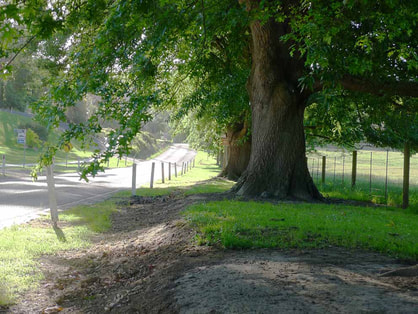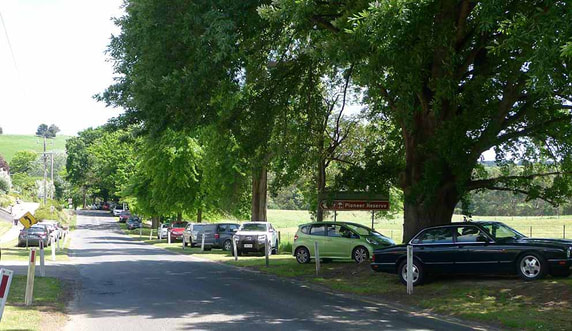 Kongwak’s Avenue of Honour
Kongwak’s Avenue of Honour By Jillian Durance
THE school children laid their poppies here yesterday, handcrafted from red paper pasted onto icy pole sticks. Poked into the hard ground in front of the memorial cairn, some have lost their purchase and lie flat; their fragile edges flutter in the southerly breeze; the halyards clank on the empty flagpole. This year the Remembrance Day services have been held elsewhere, but at least the children remembered: yesterday.
Today, Saturday, the road through Kongwak is quiet. The trees fringing the northern side stand straight, trunks evenly spaced. All deciduous, they have sprouted a fresh green in the past few weeks; oaks and pinoaks, mainly, some have trunks broad enough to hide behind. European trees, planted over a hundred years now, by women it is said whose sons and brothers had left the district to go to war on the other side of the world. For ‘King and Country’.
THE school children laid their poppies here yesterday, handcrafted from red paper pasted onto icy pole sticks. Poked into the hard ground in front of the memorial cairn, some have lost their purchase and lie flat; their fragile edges flutter in the southerly breeze; the halyards clank on the empty flagpole. This year the Remembrance Day services have been held elsewhere, but at least the children remembered: yesterday.
Today, Saturday, the road through Kongwak is quiet. The trees fringing the northern side stand straight, trunks evenly spaced. All deciduous, they have sprouted a fresh green in the past few weeks; oaks and pinoaks, mainly, some have trunks broad enough to hide behind. European trees, planted over a hundred years now, by women it is said whose sons and brothers had left the district to go to war on the other side of the world. For ‘King and Country’.
In August 1918, that war, now known as The Great War, was not yet over, but on a splendid winter’s day the people of Kongwak stood here at the hall and heard the words paying tribute to “the noble sacrifice” of the boys at the front, words reminding them that they were a “peace-loving nation” that sometimes needed in the cause of right to “unsheathe the sword”.
The trees went in. The thoughts of those who positioned them and covered bare roots with soil can only be imagined. Mrs. Euphemia Williams, secretary of the school committee, had lost her son Alfred nearly a year before in Belgium, during the third battle for Ypres. His body, like so many others, had “no known grave”. Was planting this tree in his birthplace of Kongwak the closest she could come to laying him to rest?
While some trees have perished over the years, they have been replaced with younger versions of themselves. The Avenue of Honour was extended in 1948 to commemorate soldiers of the Second World War. The Avenue now stretches a kilometre through the town that calls itself “The Valley of Peace”.
Tomorrow, Sunday, the market down the way will throng with people looking for bargains, longing for coffee, keen to catch up with friends; the road will stream with traffic; cars will thread their way through metal posts meant to hold them back from parking here, under the trees of the Avenue of Honour.
Their drivers, unaware of “No Standing” signs will only see an empty space, a shady spot, not the sacred place it was intended to be. Slowly the earth compacts over old roots.
The act of remembering suggests that something was known in the first place then briefly or long forgotten. The wearing of a poppy is a significant act, but ephemeral. Trees, if not eternal, are visible, growing, living memorials of a past that should never be disregarded. Nor forgotten.
Written on Remembrance Day, November 11, 2023
The trees went in. The thoughts of those who positioned them and covered bare roots with soil can only be imagined. Mrs. Euphemia Williams, secretary of the school committee, had lost her son Alfred nearly a year before in Belgium, during the third battle for Ypres. His body, like so many others, had “no known grave”. Was planting this tree in his birthplace of Kongwak the closest she could come to laying him to rest?
While some trees have perished over the years, they have been replaced with younger versions of themselves. The Avenue of Honour was extended in 1948 to commemorate soldiers of the Second World War. The Avenue now stretches a kilometre through the town that calls itself “The Valley of Peace”.
Tomorrow, Sunday, the market down the way will throng with people looking for bargains, longing for coffee, keen to catch up with friends; the road will stream with traffic; cars will thread their way through metal posts meant to hold them back from parking here, under the trees of the Avenue of Honour.
Their drivers, unaware of “No Standing” signs will only see an empty space, a shady spot, not the sacred place it was intended to be. Slowly the earth compacts over old roots.
The act of remembering suggests that something was known in the first place then briefly or long forgotten. The wearing of a poppy is a significant act, but ephemeral. Trees, if not eternal, are visible, growing, living memorials of a past that should never be disregarded. Nor forgotten.
Written on Remembrance Day, November 11, 2023
